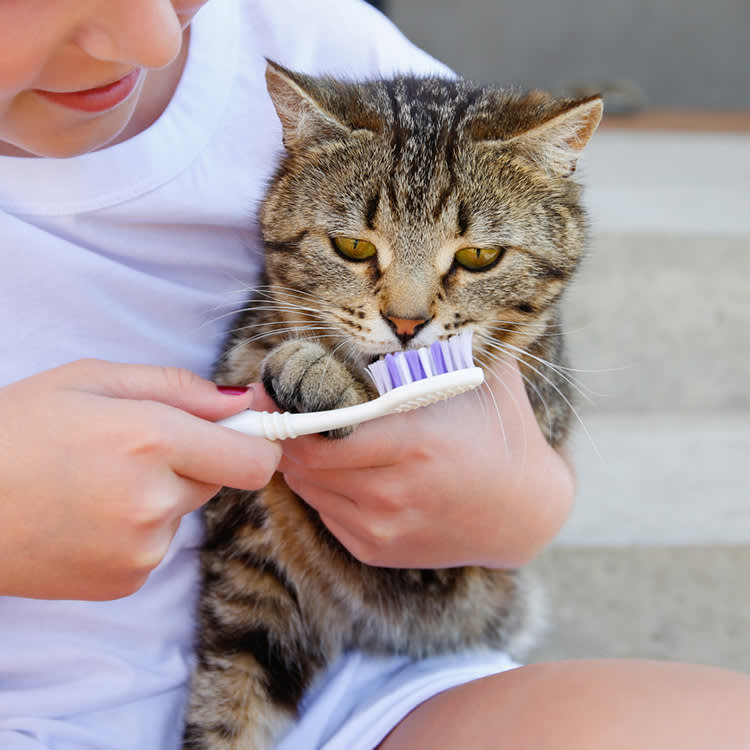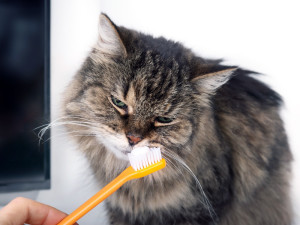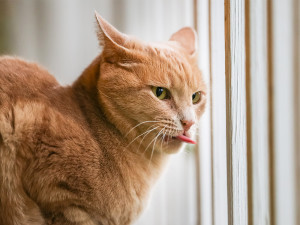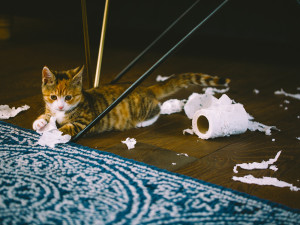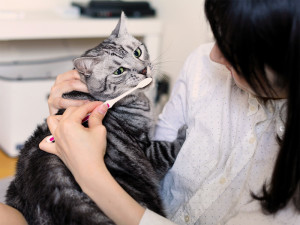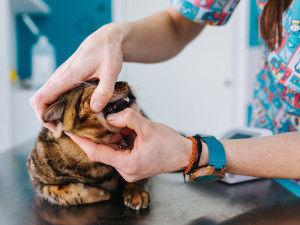Taking Care Of Your Cat’s Teeth Might Just Help Them Live Longer
Health issues that begin in the mouth do not stay in the mouth. Stop them before they start.
At the height of the pandemic, I adopted two elderly cats: Pumpkin and Bear. When I showed up at the rescue to get them, I was informed that most of their teeth had been removed. I was shocked and more than a little worried, but the rescue assured me that their teeth were in a terrible state when they arrived, and pulling them was the only option.
Apparently, the person who surrendered Pumpkin and Bear admitted to the rescue that she had never taken them to the vet. Not once in 13-plus years. So when she surrendered them, their teeth were a mess — breaks, build-up, decay, and loss. Bear still had a few teeth in the front, but Pumpkin was all gums. He also developed lesions and growths along his jaw and into his ear canal. This required additional surgery before I adopted him and proved chronic over the two and a half years we spent together. He required multiple daily medications and sometimes as many as three trips per week to the vet, whose office was an hour from my apartment by train.
I grew up with cats and had a cat after college, but I never thought about the health of their teeth. It didn’t seem to be an issue. On some level, I probably thought their teeth were somehow self-cleaning in a way ours aren’t. But, of course, they’re not. A cat’s teeth aren’t subjected to the corrosive effects of sugar or the decades of wear and tear that ours are, but that doesn’t mean they’re indestructible.
Taking care of your cat’s teeth will help them stay healthy.
“Like us, cats can develop dental diseases that affect their teeth and gums, leading to pain and other health consequences,” says Dr. Kristin Davisopens in new tab, medical director at Thrive Pet Healthcareopens in new tab and partner at Gentle Care Animal Hospital at Ten Ten in Cary, North Carolina. “The most common dental diseases for cats are feline tooth resorption [progressive tooth loss], periodontal disease, inflammatory conditions, fractured teeth, and oral masses/growths. These conditions can present in cats even at a relatively early age and more than half of cats over three years old exhibit signs of dental disease.”
How much do you spend on your pet per year?
By the time Pumpkin had his teeth removed, his overall health had been compromised to a point where his issues were now incurable. The growths in his ears were uncomfortable enough, but they caused other problems and led to infections. He eventually developed cancer deep in his ear canal, which, by the time we found it, had spread throughout his body. He started to lose weight and, eventually, I had to have a vet come to our home and put him to sleep.
Pumpkin was the loveliest, sweetest cat I ever met. I was obsessed with him and even now, a year after his death, there are times when I get into bed and find myself looking at the door as if expecting him to come in for his nightly snuggle. There were day snuggles, too, of course, but the hour-long nighttime super-snuggle was our most intimate and cherished time together, and I still miss it.
Pumpkin was around 16 and a half years old when he died, but I‘m certain he would have lived longer, and in greater comfort, if his previous human had just addressed his dental issues when they began. “Diseased teeth left in the mouth will continue to be painful and can lead to more problems,” says Dr. Davis. “Chronic, untreated dental disease can also lead to the potential extension of infection and inflammation beyond the mouth, spreading it to other body systems such as the heart, kidneys, and liver.”
I put Bear to sleep two years before Pumpkin, after the vet found a massive cancerous tumor growing in his midsection. I didn’t ask where the growth came from or what could have caused it. At the time, I only cared that it had metastasized and death was inevitable. Now, though, I wonder if it is possible Bear’s issues started in his mouth, just like Pumpkin’s. I wouldn’t be surprised.
Kitties need dental cleanings, too.
If it’s true that I lost the two most charming cat’s I’ve ever known because of dental issues, what an absolute and pointless shame that is, because taking care of your cat’s teeth can be pretty simple. “The best thing you can do is to have your cat’s teeth cleaned professionally in the veterinary office under anesthesia before any problems are visually apparent,” Dr. Davis says. “In the past, veterinarians often waited until the teeth ‘looked dirty’ before advising a professional dental cleaning. But now we know we can only see the full extent of dental issues in cats or dogs with dental X-rays obtained under anesthesia.” (Costs of dental cleanings will very depending on where you’re located; chat with your vet.)
Dr. Jyothi Alagappanopens in new tab, doctor of veterinary medicine at Small Door Veterinary in New York City’s West Village, also recommends at-home treatments like “tooth brushing with toothpaste specifically formulated for cats, dental treats and toys to reduce plaque and tartar, and feeding your cat a balanced diet that promotes dental health.” Of course, it’s very possible that your cat would rather jump into a bathtub of cold water than allow you to come near them with a toothbrush. So, using other daily maintenance products, like Plaque Off,opens in new tab or something else your vet might recommend, can be a great solution.
If Pumpkin and Bear’s previous human had done any of these things, they might still be alive today, and they almost certainly wouldn’t have needed to have so many teeth pulled.
If needed (and let’s hope not), a tooth extraction can help your cat.
Getting your cats’ teeths extracted should be a last resort. That said, when teeth need to be removed, doing so can have a profound impact on your cat’s quality of life. “Many cats feel less pain and eat better immediately following the removal,” Dr. Davis says. “And cat [parents] often report seeing positive changes in behavior following surgery, such as their cats being more social, more playful, and generally happier. Cats with severe oral disease eat better [after surgery] and do exceptionally well long-term, even with minimal or no teeth remaining.”
Indeed, cats without teeth can even eat dry food (after their incisions have healed), if they so desire. The foster who took care of Pumpkin and Bear before I adopted them told me that, but I didn't believe her until I got them home and watched them wolf down the dry food she’d given me to help with the transition.
“Even cats with a full set of teeth will often swallow their food without much chewing,” Dr. Alagappanopens in new tab says. “A cat’s teeth are more adapted to catching and holding prey than grinding food anyway. They have strong, agile tongues to help move the food to the back of their mouths so they can swallow it and their stomachs can break down even dry kibble without chewing first. Over time, a cat's gums can also toughen up and become more efficient at helping to break down food.”
I soon transitioned Pumpkin and Bear to wet food, which they seemed to prefer, but it was a relief to know that the loss of their teeth didn’t seem to negatively impact their lives. Indeed, they probably would have been more impacted by not having their teeth removed, as they were doubtless in tremendous pain and discomfort long before anything was done to help them. “Because of their intense survival instincts, cats will often hide signs of pain or discomfort,” Dr. Alagappan says. “Many cats will continue eating despite significant dental disease, and it is often only after addressing the problem that [cat parents] realize how much discomfort their cat has been in.”
Bottom line: Take care of your cats’ teeth.
I’m so happy I got to have Pumpkin and Bear for the all-too-brief time that I did, but I would much rather they were cared for properly from the beginning. Of course, I’m not aware of what barriers may have existed to make their mom feel as if she couldn’t bring them to the vet. But if the women who surrendered them had just taken them to be seen once in a while and generally paid attention to what was going on in their mouths before it developed into a chronic issue, she might not have had to give them up.
I don’t know why she abandoned them — she gave the rescue no explanation — but they were way too gentle and affectionate not to have been loved and treated with kindness and affection while in her care. I suspect that once she realized how extensive their issues were and how much it would cost to treat them, she looked for a way to relieve herself of the financial burden of caring for chronically ill cats. Maybe not.
Maybe that’s just the story I tell myself to try and make sense of why she did what she did. But whatever the reason, the lesson is clear: Don’t wait to treat your cat’s tooth problems. Don’t wait until you notice something is wrong. Be proactive. You could be adding years of comfort to their lives.
